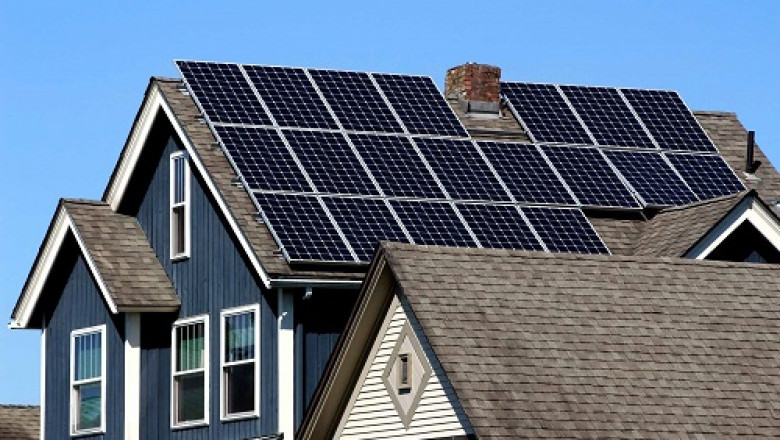views
Selecting the right solar panels for a shingle roof is an important decision for homeowners aiming to harness renewable energy efficiently. Shingle roofs are one of the most common roofing materials in the United States, offering compatibility with various solar panel systems. However, choosing the right solar setup requires careful consideration of factors like panel type, roof condition, and energy requirements. This guide provides insights into making the best choice for your home.
1. Understanding Shingle Roof Compatibility
A shingle roof is an excellent surface for solar panel installations due to its widespread use, durability, and adaptability. Asphalt shingles, in particular, are lightweight and can easily support solar panel mounting systems. Before choosing your panels, confirm that your roof’s structure and materials can handle the additional load of solar panels without compromising integrity.
2. Assessing Roof Condition and Lifespan
Before installing solar panels, it’s vital to evaluate the current state of your shingle roof. Solar panel systems are designed to last 25 years or more, so your roof should have a similar or longer lifespan. If your roof is nearing the end of its life, it’s better to replace it before installation. Proper roof maintenance and a strong foundation ensure that your investment in solar energy lasts without interruption.
3. Choosing the Right Type of Solar Panels
There are several types of solar panels available, and your choice will depend on your roof's design and energy goals:
- Monocrystalline Panels: These are highly efficient and ideal for small roofs with limited space. Their sleek black design often blends well with modern shingle roofs.
- Polycrystalline Panels: A cost-effective option, these panels perform well but are slightly less efficient than monocrystalline panels. They are suitable for larger roof spaces.
- Thin-Film Panels: Lightweight and flexible, these panels can adhere directly to a shingle roof. However, they are less efficient and may require more surface area.
Consider the roof angle, shading, and overall energy production needs when selecting the panel type.
4. Evaluating Energy Requirements
Calculate your household’s average energy consumption to determine the number of solar panels needed. Review your electricity bills to find the kilowatt-hours (kWh) you consume monthly. From there, consult with a solar energy provider to match your energy needs with the appropriate panel system.
5. Consulting Solar Panel Installation Experts
Solar panel installation on a shingle roof requires specialized knowledge to ensure secure mounting without damaging the roof. Professional installers can assess:
- The most effective mounting method for your roof type.
- The optimal placement to maximize sunlight exposure.
- Techniques to prevent water leaks or structural damage.
An expert installer will also secure permits and inspections, streamlining the process for you.
6. Considering Roof Orientation and Sunlight Exposure
The orientation of your shingle roof directly impacts solar panel performance. South-facing roofs typically receive the most sunlight in the northern hemisphere, making them ideal for solar panel placement. East- and west-facing roofs can also work but may require more panels to achieve the same energy output.
7. Exploring Mounting Options
Shingle roofs allow for various mounting options, such as:
- Roof-Mounted Systems: Panels are attached directly to the roof using mounting racks. Ensure proper flashing to prevent leaks.
- Ballasted Systems: These are weighted systems that don’t penetrate the roof, suitable for flat shingle roofs or areas with structural concerns.
Work with your installer to select a mounting system that minimizes roof damage while optimizing energy production.
8. Checking Warranties and Certifications
A high-quality solar panel system should come with reliable warranties covering both the panels and the installation process. Look for:
- Performance Warranty: Ensures panels produce a certain percentage of power over their lifespan.
- Product Warranty: Covers defects or malfunctions in the panels.
- Installation Warranty: Protects against installation-related issues such as leaks or mounting failures.
Certifications like UL (Underwriters Laboratories) and IEC (International Electrotechnical Commission) indicate that the panels meet safety and performance standards.
9. Exploring Financial Incentives
The cost of installing solar panels on a shingle roof can be offset by government incentives and tax credits. Check for:
- Federal Solar Tax Credit (ITC): Allows you to deduct a percentage of the installation cost from your federal taxes.
- State and Local Incentives: Many states offer rebates, tax exemptions, or performance-based incentives.
- Net Metering Programs: These programs let you sell excess energy back to the grid, reducing your electricity bill.
10. Prioritizing Aesthetic Appeal
While functionality is crucial, the visual appeal of your home matters too. Solar panels should complement your shingle roof without overshadowing its appearance. Black-framed or frameless panels often blend seamlessly with asphalt shingles, enhancing the overall aesthetics.
11. Partnering with a Trusted Solar Company
Choose a reputable solar energy provider with experience in installing panels on shingle roofs. A reliable company will guide you through the entire process, from selecting the right panels to ensuring a flawless installation. Working with experts ensures your system is efficient, durable, and meets all safety regulations.






















Comments
0 comment